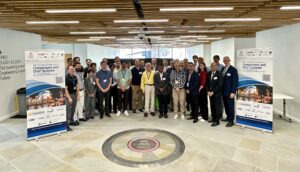Looking back at the 7th Short Course on CFD in Positive Displacement Machines
The 7th Short Course on Computational Fluid Dynamics (CFD) in Positive Displacement Machines held on 6–7 September 2025 at the renowned City St. George’s, University of London, was a dynamic blend of knowledge-sharing, innovation, and networking. Bringing together professionals, researchers, and students, it offered an exceptional platform for learning and collaboration. Here’s a look back at some of the key highlights from this year’s Short Course and our time there.
What the Short Course Offered
The Short Course was structured to provide both depth and breadth in emerging CFD technologies as they apply to PDMs. Highlights included:
- Emerging CFD Methods & Tools: Attendees explored recent advances in simulation tools such as new solvers, improved meshing strategies, multi-physics approaches, and more efficient and accurate ways to model complex flows.
- Industry-Applied Case Studies: Several presentations showed how CFD is being used practically for performance optimisation, loss reduction, flow and heat transfer modelling, and in diagnosing real-world design challenges.
- Bridging Academia & Industry: The programme featured researchers and industry engineers alike, facilitating direct dialogue and exchange of perspectives—what works in a lab model vs what works in commercial, operational systems.
- Hands-on, Forum Elements: There were sessions designed around discussion, question-and-answer, and interactive exploration of model validation, experimental techniques, and data interpretation.
Key Themes and Insights
Through the presentations and discussions, a few recurring themes stood out:
- Complex Leakage & Heat Transfer Modelling: A number of speakers addressed modeling of leakage flows, conjugate heat transfer, and how small geometrical clearances and manufacturing tolerances can significantly impact performance.
- Multiphysics & Fluid-Structure Interaction (FSI): Work on how fluid loads, vibrations, material dynamics, and structural deformations interact with fluid flow in PDMs was especially interesting. There is growing sophistication in including these effects in both CFD and hybrid (CFD + experimental) studies.
- Tool Integration and Workflow Efficiency: There was strong interest in streamlining workflows: from rotor and housing geometry import / creation → meshing → solver setup → post-processing. Many attendees were keen to reduce the time from concept to verified model.
- Visualization, Data-Driven Methods, and Validation: Innovations in data visualisation, use of AR/VR for teaching & research, as well as empirical validation (test beds, physical experiments) came up repeatedly. It was clear that validation remains a critical link—simulations are powerful, but they must be grounded in measured reality.

Our Experience and Contributions
As PDM Analysis, attending this Short Course & Forum was particularly meaningful. We were able both to learn and to share. We engaged closely with new research on CFD modelling techniques, seeing how peers are solving for flow losses, rotor geometry effects, leakage, and more.
We also exchanged ideas on how our software tool SCORG aligns with many of the challenges raised, especially in workflow efficiency, CFD integration, geometry import and mesh generation, and performance prediction across varying operating conditions.
The valuable discussions we had about validation showcased how SCORG’s outputs (chamber volumes, port areas, thermodynamic losses) can be cross-checked experimentally or via high-fidelity CFD. These conversations are also helping us plan upcoming enhancements.
Summary and Looking Forward
The 7th Short Course & Forum on Emerging Technologies for CFD in Rotary Positive Displacement Machines was more than just another technical gathering, it was a dynamic forum where innovation, practical insight, and collaboration came together. We’re grateful to the organisers, the speakers, and all attendees for the rich discussions and shared energy.
Until the next course, let’s keep pushing the boundaries of what’s possible with CFD in positive displacement machines.
Our next stop, the 14th International Conference on Compressors and Their Systems in collaboration with the Centre for Compressor Technology at City, University of London.
To stay up to date with PDM Analysis, follow us on LinkedIn here and Twitter here.